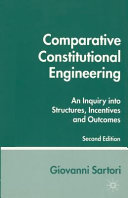
Comparative Constitutional Engineering
By - Giovanni Sartori
Floor
-
Floor 1
Published
-
Macmillan Press, Basingstoke, 1997
ISBN 10 - 0333675096
ISBN 13 - 9780333675090
Book Status
-
1 Qnty Available with us.
Subject
-
Comparative Government
Shelf No
-
14
Call Number
-
320.445 SAR 1997
Edition
-
2nd ed
Physical Description
-
xii, 217 pages ; 23 cm
Notes
-
includes index